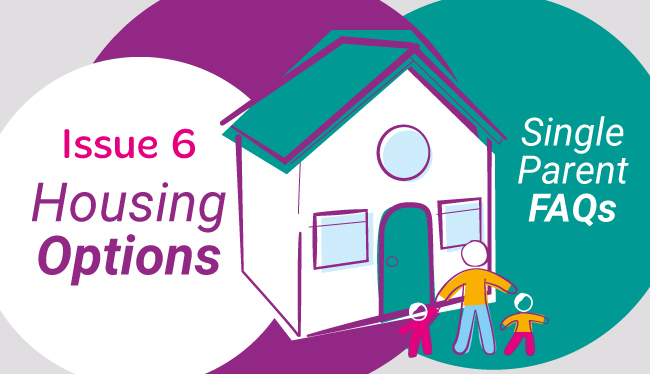Single Parent FAQs: Housing Options

11/08/2021
Our advice and information team, who work on our Lone Parent Helpline, webchat and Ask a Question feature, receive questions from single parents around Scotland every day.
Our new feature – Single Parent FAQs – on our newsletter and blog spotlights Frequently Asked Questions on a different topic each month.
This month, our advice team have been receiving a lot of calls from single parents regarding housing options.
See some of the answers we’ve given.

See our previous issues of Single Parent FAQs on child maintenance, child contact, Universal Credit, getting back into education as a single parent and financial support for single parents.
Remember you can submit your own question via the Ask A Question feature on our website any time and our expert advisers will respond. This is open to single parents, their families, or anyone working to support single parent families – keep your questions coming!
Housing options FAQs
Q. I’m a single parent and I’ve always lived at my parent’s house but that isn’t working out very well just now and I would like to move out, I don’t know what my options would be for renting a property?
A. Your options for renting a property would be to rent from a social landlord which include the local council, housing associations and cooperatives or renting from a private landlord. See more information about renting a home.
Q. I have recently lost my job and I am worried how I will be able to pay my rent is there any financial help I can receive to pay my rent?
A. Depending on your circumstances and savings you may be able to claim universal credit for housing costs and money for you and your children for a universal credit calculation you can call our advice line on 0808 801 0323 or more information about calculating Universal Credit can be found here.
Q. I have been trying to bid for properties, but I keep missing out, is there any help available for a deposit to get private rented accommodation?
A. You can apply to the Discretionary Housing Payment for upfront housing costs and deposits more info about Discretionary Housing Payments can be found here.
Q. My son has gone to live at his dad’s, and I now have a spare bedroom and don’t know how I can cover the rent now I’m not entitled to this 3-bedroom property now it is just me and my daughter.
A. You may not get your full rent paid if you live in a home with more bedrooms than the council says you need. This reduction in the money you receive to pay your rent is commonly known as the ‘bedroom tax’. A reduction of 14% will be made to your maximum housing benefit if you have one extra room and 25% for two or more extra rooms.
However, you can apply to your local council for a ‘discretionary housing payment’ to meet this shortfall. Although the housing officers can normally decide who can or can’t get a discretionary housing payment the Scottish Government has said it must be paid to tenants in council, cooperative and housing association properties who are affected by the ‘bedroom tax’.
Q. I have a mortgage and I work 16 hours can I apply for help to pay my mortgage; I receive Universal Credit?
A. Universal Credit housing cost element does not include mortgage help when the claimant is working, you should try and speak to your mortgage company if you are finding it difficult to meet the cost of your mortgage and see if they can offer any advice. You could also get in touch with us, and we could do a benefit check to ensure you are receiving everything you and your family are entitled too.
See all the ways you can get in touch with us here.
Q. My son is disabled, and I can’t manage him up and down the stairs anymore and I was wondering if there is any grants, I can apply for to make a downstairs shower room?
A.
If your home needs improved or adapted to make it safe and suitable to live in you can contact your local council’s ‘Scheme of assistance’ for advice. The scheme gives information on grants and services available to adapt your home to suit you if you have a disability or are elderly. There may also be grants available to make general repairs and home improvements. Each local council offers different help and support. See their website for further details what is available, who can apply and how to apply.
Q. I have separated from my partner, and we have a rented flat together and he won’t leave the flat, both our names are on the tenancy agreement is there anything I can do to get him to move out?
A. If you are unable to reach an agreement with your ex-partner or landlord about who remains in the home, you could both leave, and the matter could go to court to decide who stays. The court will decide if the tenancy can be transferred to you based on you and your ex-partner’s circumstances and including the needs of your children, your financial situation and the behaviour of you and your ex-partner. We recommend that you get professional help from a solicitor or other legal service to do this.
Q. I have just got my keys to social housing, I’m on universal credit and not working just now, is there anything I could apply for items for the flat I don’t have any furniture or flooring.
A. You can apply to the Scottish Welfare Fund for a Community Care Grant for items for your house. If awarded you may get items delivered from the fund. If you are unsuccessful or don’t get everything you need you can search for grants on the Turn2us website.
Q. I am having problems with my neighbour and don’t know where to get advice?
A. If you feel you could approach your neighbour and discuss the issue, if that doesn’t work contact your landlord, or if you feel threatened then contact the police. There is a lot of information on Shelter Scotland’s website.
Still have questions?
Contact our advisers via our Lone Parent Helpline on 0808 801 0323.
Or get in touch via the webchat, email or submit a question at our 'talk to us' section. We can offer advice and information on issues affecting single parents, including benefits, childcare, separation, work, child maintenance and more.
Talk to us